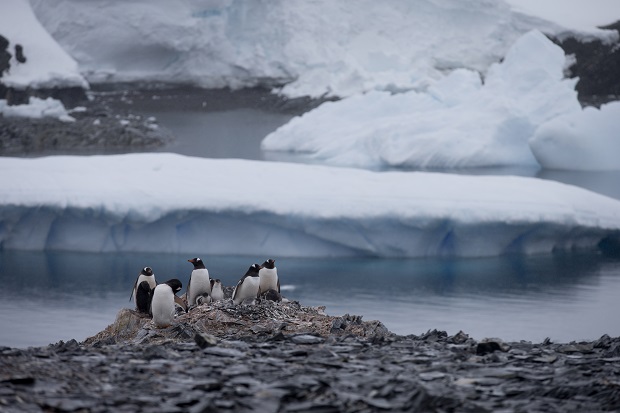Penguins wander far, but come home to mates — study

In this Jan. 22, 2015 photo, Gentoo penguins stand on rocks near the Chilean station Bernardo O’Higgins, Antarctica. Members of another species of penguins, the southern rockhopper, have been observed to remain faithful to a single mate despite months of separation over long distances. AP
PARIS, France — A species of remarkably faithful penguins may have found the secret to monogamy — plenty of time spent very far apart.
A group of southern rockhopper mums and dads were hundreds — in one case thousands — of kilometers (miles) away from each other when not making babies, says a study out Wednesday.
Yet when the birds returned home to New Island off the coast of Argentina they managed to find each other and mate, according to findings published in the prestigious Biology Letters journal.
While their reunions may have been sweet, they were decidedly short, with the penguins together for just under a quarter of the year.
“In these extremely faithful animals — the pair bonds for breeding may last all lifelong in this species — the partners may actually be separated by hundreds to thousands of kilometers at sea,” researcher Jean-Baptiste Thiebot told AFP.
Months away
The birds engage in an incredible variety of behavior including “divorce” and home building that might seem very familiar to humans.
Once back on land in October after six months or so at sea, the penguins got straight to the business of mating, egg-laying and incubation, all of which kept them busy for about a month.
There was no lingering over the kids here, as the rearing of the chicks took up another roughly 70 days before the parents split up in April.
Given the risk the animals could lose each other for good by going their separate ways in the wild, the researchers wanted to see if the creatures would make an effort to stay close together outside breeding season.
“Divorce” happens among the penguins, but it is rare to find two ex-partners breeding with somebody new, Thiebot said.
Major threat to birds
The scientists decided to follow the penguins by clipping lightweight sensors to 20 birds — 10 couples — which tracked their movements during their roughly six-month separations.
Seven pairs made it home and rekindled their relationships, while two birds came back solo. Researchers surmised the remaining penguins from their study either died at sea or moved away.
The data from the sensors showed the penguins generally stayed hundreds of kilometers apart as they feasted in the ocean.
However, researchers found one case where a couple had nearly 2,500 kilometers between them.
When the birds finally got back together they promptly turned into homebodies, with most of their time spent at the nest.
Females first to leave nest
It led researchers to note that birds like Emperor penguins, which do not build a home together, are less likely to be monogamous.
“Penguins may use the same nest site or nesting area to breed every year, over and over again,” Thiebot said. “This probably helps the two partners to meet up ashore at a known place.”
The birds’ elaborate courtship rituals may also help them recognize each other.
Among the penguins it was mums who set out first after breeding, leaving nearly a week earlier than dads. The lady birds also went on to cover hundreds more kilometers than the males in their half a year away.
According to Thiebot the findings highlight the need for new safeguards to protect against man-made disasters like oil spills.
He noted that an event that kills 1,000 penguins could in fact be killing half of 1,000 couples.
“We know that when a bird loses his/her partner, its success of breeding with a new mate generally decreases, at least temporarily, or the bird even skips breeding,” he added.